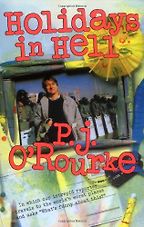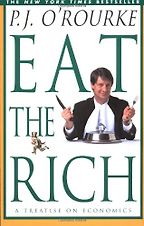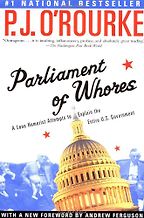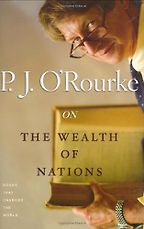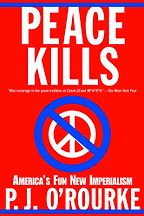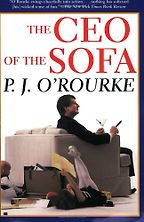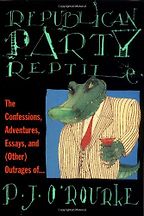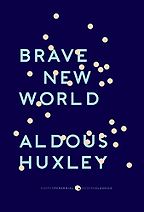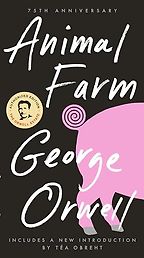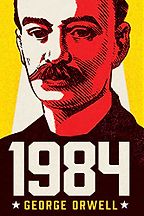
©Cato Institute
Books by P. J. O’Rourke
P. J. O’Rourke (1947-2022) was an American political satirist who wrote lots of very, very funny books. His politics were conservative and libertarian and not all his jokes have stood the test of time, but he was cosmopolitan in outlook, travelling widely and casting his keen satirical eye over what he saw around the world. Until his death in 2022, he was credited with having more citations in The Penguin Dictionary of Humorous Quotations than any other living writer.
Holidays in Hell
by P. J. O’Rourke
From 1985-2000 P.J. O'Rourke was Rolling Stone's foreign affairs desk chief and travelled around the world reporting on crises. "I wanted to know where trouble came from and why the world was such a lousy place," he wrote, about his decision to leave National Lampoon, where he had started his writing career. In this book, he recounts his travels to Lebanon, South Korea, Panama, Poland, the Philippines and El Salvador, as well as South Carolina, where he is converted to Satanism.
Eat the Rich: A Treatise on Economics
by P. J. O’Rourke
You can read an economics textbook, or you can read P.J. O'Rourke's Eat the Rich, a very funny take on the perennial question economists ask: why are some countries so rich and others so poor? In memorable opening lines, O'Rourke posited, "It's not about brains. No place on earth...is dumber than Beverly Hills and they're wading in gravy. In Russia, meanwhile, where chess is a spectator sport, they're boiling stones for soup."
Parliament of Whores: A Lone Humorist Attempts to Explain the Entire U.S. Government
by P. J. O’Rourke
P.J. O'Rourke's introduction to how America's political system's machinery works, written after going to report on the 1988 US presidential race for six months (though his stay in Washington ended up stretching to two years). He writes, "Majority rule is a precious, sacred thing. But—like other precious sacred things, such as the home and family—it's not only worth dying for; it can make you wish you were dead."
Give War a Chance
by P. J. O’Rourke
Reporting on the 1991 Gulf War for Rolling Stone and the fall of the Soviet Union gave P.J. O'Rourke the chance to write a book about 'evil'. The book opens with his coverage of the fall of the Berlin Wall, where an East German border guard asking for a souvenir brings him to tears. "I really didn't understand before that moment, I didn't realize until just then—we won. The Free World won the Cold War."
On the Wealth of Nations: Books That Changed the World
by P. J. O’Rourke
Adam Smith's Wealth of Nations is the founding text of economics, but it's a long and hefty tome. Here, P.J. O'Rourke sets out to explain it with useful chapter headings like, "Why is The Wealth of Nations so Damn Long?" He also has a chapter on The Theory of Moral Sentiments (essential reading alongside The Wealth of Nations, as Karl Rove told us, because it explains human striving).
Peace Kills: America's Fun New Imperialism
by P. J. O’Rourke
P.J. O'Rourke's take on US foreign policy, published in 2004, and revealing deep frustration with policies of the Bush administration to pursue nation-building and spread of democracy. He starts out with a trip to Kosovo: "Kosovo certainly taught the world a lesson. Wherever there's suffering, injustice, and oppression, America will show up six months late and bomb the country next to where it's happening."
The CEO of the Sofa
by P. J. O’Rourke
In which P.J. O'Rourke holds forth from his sofa, starting with a rant about the United Nations. The book was modelled on The Autocrat of the Breakfast Table by Oliver Wendell Holmes, compared (according to O'Rourke) to "champagne after breakfast cups of weak tea" by Virginia Woolf. Some love this book, others find the miscellaneous collection of articles a little disorganized.
Republican Party Reptile
by P. J. O’Rourke
P.J. O'Rourke's 1987 collection of 21 articles, "written from a conservative Republican point of view" but intended to be funny. "'Funny Republican' is an oxymoron in the public mind," he writes in the introduction. "Sense of humor and conservatism are not supposed to go together." O'Rourke would spend this book, and the rest of his writing career, trying to prove that oxymoron wrong.
Interviews with P. J. O’Rourke
The Best Political Satire Books, recommended by P. J. O’Rourke
Satire is humour used for a moral purpose, explains American political satirist P.J. O’Rourke—though it doesn’t have to be particularly funny and can be quite dark. Here, he chooses five classic works of political satire, books that lay bare the shortcomings of not only communism and fascism but also the two-party system and the quest for a perfect society where everyone is happy. Books by P.J. O’Rourke recommended on Five Books
